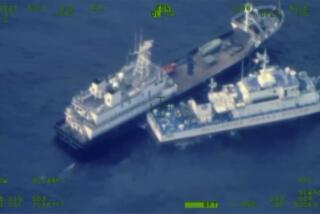U.S. Officials Fear Civil War in Philippines
- Share via
WASHINGTON — The Reagan Administration warned in unusually blunt comments Wednesday that the Philippines under President Ferdinand E. Marcos is headed toward a civil war and possible Communist takeover and called on Marcos to conduct free elections and reform his military.
In testimony before a Senate hearing--but intended as a signal to Marcos--a top State Department official said that the Philippines “is in deep trouble.” And a Pentagon official warned: “Without vigorous reform, a Communist triumph appears likely.”
Their statements were new signs of the Administration’s concern that Marcos, the aging and ailing authoritarian leader of the former U.S. colony in the Pacific, has failed to counter the problems of corruption and economic stagnation that have spawned a growing Communist insurgency.
Paul D. Wolfowitz, assistant secretary of state for East Asian and Pacific affairs, told the Senate Foreign Relations Committee that the outlook for a return to democracy in the Philippines appears “pessimistic,” despite mounting pressure on Marcos.
“Progress has been halting, uneven and painfully slow,” Wolfowitz said. “In some areas there have been backward steps. . . . Time is of the essence, and time is not being used very well.”
He said the Administration is concerned not only because the Philippines is the site of the U.S. Navy’s most important base in the western Pacific, but also because a Communist takeover would threaten the stability of other pro-American regimes in the area.
Richard L. Armitage, assistant defense secretary for international security affairs, said that Marcos’ failure to replace corrupt and inefficient military officers has helped the Communist New People’s Army in its guerrilla war against the regime.
Rebel Strength Grows
“The trends are still bad. They’re still negative,” Armitage said. “The number of guerrillas, NPA, are up. The number of (NPA) irregulars is up. The number of wounded is up. . . . Initiative still lies with them and their political ideology, backed by armed elements, continues to spread.”
He estimated the New People’s Army strength at 16,500--far above the Philippine government’s official estimate of 9,000.
“We still face a situation of strategic stalemate in the next three to five years,” Armitage said.
Such a stalemate, Wolfowitz said, would not necessarily mean a quick Communist takeover of the Philippines, but more likely “a civil war on a massive scale.”
“That is the direction in which we are heading,” he said.
Despite its bleak assessment, Wolfowitz said, the Administration still believes Marcos can remedy the situation--if he acts fast. “I think right now that the situation is one that would respond rather rapidly to a dramatic program,” he added.
Opposes Aid Cut
He said Congress should offer to increase aid to the Philippines if Marcos holds fair elections and implements both military and economic reforms. He rejected the idea of reducing aid, arguing that it would probably fail to sway Marcos and could “make the situation even worse.”
The two officials got a skeptical, frustrated reaction from Senate Foreign Relations Committee Chairman Richard G. Lugar (R-Ind.), normally a staunch supporter of the Administration.
“What is our course of action?” Lugar complained. “I gather our current policy is one of keeping things afloat and hoping for some fortuitous circumstance to intervene.”
“Our patience has about run out” with Marcos, he warned.
But Wolfowitz insisted that the Administration’s policy of cajoling Marcos carefully toward reforms is a good one.
He said that Sen. Paul Laxalt (R-Nev.), the close friend of President Reagan who visited Marcos last week, had delivered the message that Reagan himself wants to see reforms.
“I think the course of action that we’ve been following has produced results,” he said. “The results are inadequate and disappointing, but they are there.”
Another Iran Seen
Sen. Alan Cranston (D-Calif.) said he sees in the Philippines “all the makings for the United States of another Vietnam, another Iran, another Nicaragua,” and proposed a program of massive economic aid that would be tied to free elections.
“I believe the best friend Communists have in Manila today is Ferdinand Marcos,” Cranston said. “Every day Marcos continues to monopolize all the levers of power brings closer the day the Communists will rule in Manila.”
Armitage indicated that he hopes Marcos will not reinstate Gen. Fabian C. Ver, a longtime Marcos crony, as chief of the armed forces if Ver is cleared of the charge that he helped plan the 1983 assassination of opposition leader Benigno S. Aquino Jr.
But, he said, “it’s a much larger problem than Fabian Ver. . . . He is not solely and totally responsible for the decline of the Philippine military.” He said that a large number of “overstaying generals” should be retired and widespread corruption eliminated.
Armitage said the Pentagon has considered alternative sites for bases if a political change in the Philippines forces the United States out of Subic Bay Naval Base and Clark Air Base. But he noted: “No single site or combination of sites . . . would give us the advantages we now enjoy in the Philippines.”
“Our policy in the Philippines is not and must not be a hostage to the bases,” Wolfowitz added. “There is no conflict between our interest in the bases and our desire for democratic reform.”
More to Read
Sign up for Essential California
The most important California stories and recommendations in your inbox every morning.
You may occasionally receive promotional content from the Los Angeles Times.














